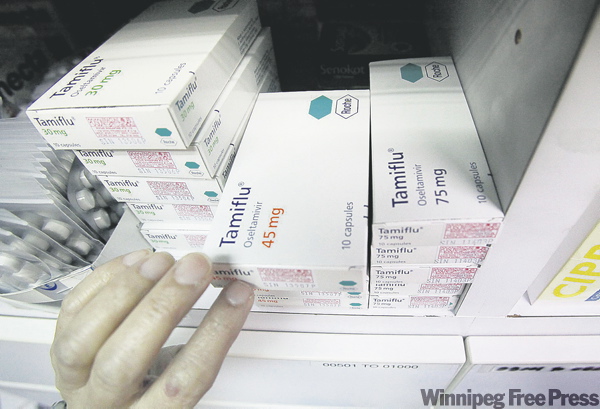Health officials facing some tough decisions
Vaccine could take months to produce
Advertisement
Read this article for free:
or
Already have an account? Log in here »
To continue reading, please subscribe:
Monthly Digital Subscription
$1 per week for 24 weeks*
- Enjoy unlimited reading on winnipegfreepress.com
- Read the E-Edition, our digital replica newspaper
- Access News Break, our award-winning app
- Play interactive puzzles
*Billed as $4.00 plus GST every four weeks. After 24 weeks, price increases to the regular rate of $19.00 plus GST every four weeks. Offer available to new and qualified returning subscribers only. Cancel any time.
Monthly Digital Subscription
$4.75/week*
- Enjoy unlimited reading on winnipegfreepress.com
- Read the E-Edition, our digital replica newspaper
- Access News Break, our award-winning app
- Play interactive puzzles
*Billed as $19 plus GST every four weeks. Cancel any time.
To continue reading, please subscribe:
Add Free Press access to your Brandon Sun subscription for only an additional
$1 for the first 4 weeks*
*Your next subscription payment will increase by $1.00 and you will be charged $16.99 plus GST for four weeks. After four weeks, your payment will increase to $23.99 plus GST every four weeks.
Read unlimited articles for free today:
or
Already have an account? Log in here »
Hey there, time traveller!
This article was published 29/04/2009 (6010 days ago), so information in it may no longer be current.
OTTAWA — To vaccinate or not to vaccinate.
That is one of a host of difficult questions Canadian public-health officials will face if the swine-flu outbreak escalates into a full-blown pandemic.
In 1976, then U.S. president Gerald Ford ordered a national vaccination campaign in response to an outbreak of swine flu at a military base in New Jersey. In the end, only one person died from swine flu, while roughly 25 people died from a rare neurological syndrome believed to have been a side-effect of the vaccine. The program, now considered a case study in how not to handle a flu outbreak, cost roughly US$500 million in today’s dollars.

Working with the World Health Organization, an international network of scientists — including the National Microbiology Laboratory in Winnipeg — is racing to develop a vaccine for the new swine-flu strain.
Canada is one of the few countries in the world that has a drug manufacturer on contract to supply the vaccine once it is developed.
But the Public Health Agency of Canada estimates it will take as long as six months to produce a vaccine, and some experts believe it could take even longer.
"When everybody talks about six months, that’s with no glitches. You start to get glitches, and all of a sudden you’re fighting to solve problems," said Earl Brown, a flu specialist at the University of Ottawa’s faculty of medicine.
Until a vaccine is ready, the primary line of defence will be the government’s national stockpile of antiviral drugs. Unlike a vaccine, antivirals do not immunize patients from a flu strain, but they can relieve the symptoms, and some experts believe they can prevent infection and slow the spread of a pandemic. Canada has stockpiled two antiviral drugs, Tamiflu and Relenza. The stockpile contains roughly 55 million doses, which officials say is enough to treat the Canadians who will require medical treatment during a pandemic. But Canadian officials and medical experts warn the current swine-flu strain could become resistant to such antivirals if the drugs are used on a wide scale too early.
"The good news, so far, is that the antivirals are working," said Dr. Robert Ouellet, president of the Canadian Medical Association. He cautioned that Canadians who haven’t been exposed to the outbreak shouldn’t look to antivirals as a preventive measure.
"Some people will be afraid and will ask to have antivirals right now, even if they don’t have the disease… . This is not something we should do."
Even with the stockpile, federal and provincial officials and health-care workers will have to decide on the fly how to co-ordinate testing for the flu, as well as how to distribute and administer the antivirals.
The logistical challenges would be even more daunting if a mass vaccination program becomes necessary. The Public Health Agency admits there would be many unknowns in the event of a pandemic, including the nature and severity of the flu strain, the availability and safety of a vaccine, and the tone of the public’s reaction.
— Canwest News Service




